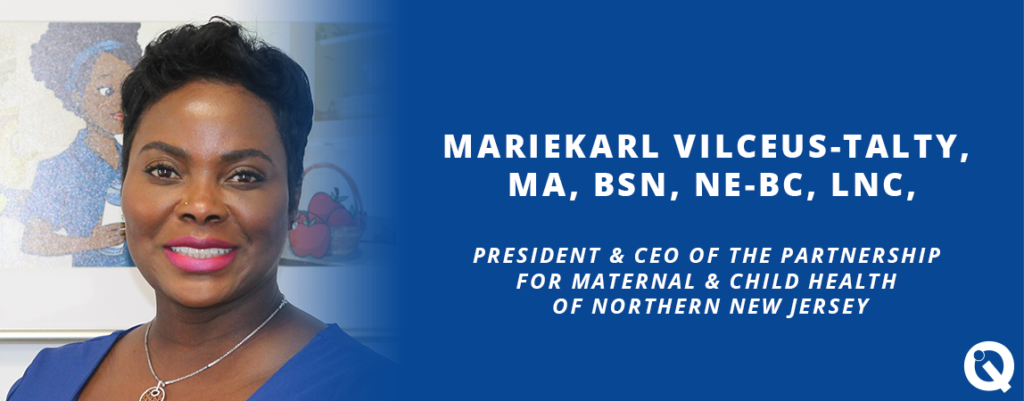Mariekarl Vilceus-Talty, MA, BSN, NE-BC, LNC, President and CEO of the Partnership for Maternal & Child Health of Northern New Jersey. The Partnership is a member of the Quality Institute, and the designated maternal health consortium for Northern New Jersey.
You have decades of direct labor and delivery patient care and managing hundreds of nurses. How does your clinical experience inform your work and priorities at the Partnership?
My years of nursing practice, as nurse executive, and working in acute care have truly been the guiding light for my work with the Partnership; the missions are directly aligned. At the Partnership, we talk about supporting pregnancy, empowering communities, engaging the health care professional, and advocating for change — exactly what I did in the acute care setting. When I have that seat at the table with legislators and policy makers, my experience as a provider and as a woman of color can really inform them about how things are operationalized in the hospital setting. I know how to work with all systems to ensure that the patient has an optimal outcome. Which is what we’re doing here at the Partnership. Sometimes regulations get handed down to hospitals that are difficult to operationalize. That’s why you need the right people at the table.
Equity and racial justice are critical issues that more people are focusing on now. What are some ways that our members and readers can better advance this work?
I think people in health care are aware that women in the United States are dying at a rate that is the highest in any of the developed countries. In New Jersey, Black and Brown women are seven times more likely to die in childbirth than their White counterparts. I am a woman with a bachelor’s and master’s education — and my White counterpart with a high school education has a chance for better outcomes than me. The first thing we must do is have the uncomfortable conversations. To say, “Yes, there is a problem.” There are disparities – some systemic – so let’s talk about how things can change. You need to prioritize equitable patient-centered care and you need a diverse and inclusive workplace for the people you are caring for to inform real change.
Your organization, in collaboration with the Prematurity Prevention Initiative, the Family Health Institute, and the NAACP – Newark Branch, is disseminating a patient birth experience survey. Tell us about it and how the results will be used.
The Maternal Experience Survey is so important. It goes back to my work as a director of patient experience when I used data to inform care and to inform outcomes. We’re always looking at the quantitative side of it, but the patient experience — the qualitative information — is a robust tool. Are people sharing that they are not listened to, or are not treated with courtesy and respect? This personal feedback represent patient safety issues. This tool of telling maternal experience stories will help us understand the unfiltered experience of women and their families, especially Black women. And that feedback directly changes and improves maternal health outcomes. The survey is for every woman throughout the pregnancy experience in New Jersey with a specific emphasis on Essex County and the Atlantic City area.
What are you most hopeful about and where do you think you can make the most change in your new role?
I feel hopeful because we have a unique perspective within the intersection of health and wellness and education and can make a change. We cover eight counties in the northern region of New Jersey. We have suburban, we have urban. We have the four largest cities in New Jersey that are truly the most diverse in the country. And then we have areas that are not so diverse. But within that, we are taking the experience of the stakeholders and we’re educating the community. And we are really bridging the gap with the providers, the hospital members that we serve, and the constituents to ensure that women and children are thriving. We are advocating for them. I see myself as a convener, as a unifier, as a trust builder — building bridges throughout the different communities to ensure that people have the education that they need to make informed decisions.
Please tell us how you might spend time away from work.
A day off? Well, it’s really all about my children – Asher is 15 and Delphine is 13 – and their activities – lacrosse and football. My husband is a writer and we also have what’s called cultural Saturdays. You may find us at the New York Botanical Gardens or maybe the Frick Collection or in Philadelphia or Washington, D.C., doing something cultural. That’s important to us.

